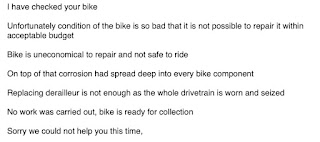The Promise that Changes Everything is the title of Nancy Kline's latest book on the Thinking Environment; and that promise is "
I won't interrupt you."Listening without interruption is at the heart of this powerful approach to helping others to think in your presence, about which I have blogged many times. Nonetheless, as I continue to study and practice the Thinking Environment, I continue to learn, and so, unapologetically, here is my latest thinking (or at least, some of it).
The context was a meeting of five of us, interested in this work, in which we had agreed to listen to each person think, without interruptions, for 45 minutes each.
So it was fascinating that at least three of the five of us interrupted our own thinking, and typically about half way through the time. One person said 'I'm done,' and stopped; but when asked what more he thought, (and thus assured of our continued interest and given permission to keep going) he thought more. And that was repeated a couple more times, until he had thought for 45 minutes.
The second person stopped halfway through, and asked someone else: "What do you think?" but again, when assured that we were still interested in what more he thought, he continued to think for the remainder of the 45 minutes.
And a third person said, after about twenty minutes, "I must be boring you by now"again, when assured that we were still interested in what more she thought, she also continued to think for the remainder of the 45 minutes.
All of which led to interesting discussions and reflections. One thing that we have frequently observed is that thinking comes in waves. Thus when someone has completed a wave of thinking, he may well think that he is done; however, if given permission, an invitation, and a stimulus in the form of a question, there is often a second (and third and so on) wave of thinking that arises. And that is often the newer, fresher thinking, too.
But the other thing, most explicit in the third case, but we all thought it was a factor in the other two, is that sense that people can't really be expected to listen to us for
this long! And that was even the case when we had a clear agreement that that was precisely what we were wanting to do. We also reflected on the fact that whilst each thinker had feared that he or she might be boring the rest of us, each of the listeners had been completely fascinated by each thinker's journey. And we all enjoyed the fact that each thinker reached some valuable places with their thinking.
So one of the dynamics is clearly that many of us are socialised into thinking we shouldn't go on too long or we will bore people. In many social contests, that is a useful thing to understand; but it was fascinating to experience how difficult that was to over-ride that, even when we had a clear contract around the time, and knew that each of us was going to get the same chance to think - and that in this context, going on was not boring.
A final reflection was how this demonstrates why thinking with a thinking partner or listener is different from thinking on our own. On our own, we often interrupt ourselves or get distracted: with a thinking partner who is genuinely interested in where we may go next with our thinking, that doesn't happen so much. And on our own, we may get to the end of a wave of thinking and think "I'm done." With a good thinking partner there, to sustain generative interest and ask a skilful invitational, and completely content-free question (such as 'What more do you think, or feel, or want to say?') we may discover that there are many more waves of thinking to enjoy, and that they take us somewhere completely unexpected, and often very valuable.
--
With thanks to Mimi Thian for sharing this photo on Unsplash








